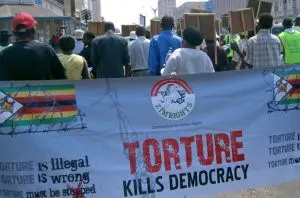
SALC condemns abduction and torture of three women leaders in Zimbabwe. Movement for Democratic Change member of parliament, Hon Joana Mamombe and Young Assembly leaders Cecelia Chimbiri and Netsai Marova were allegedly abducted, detained and tortured over the last week. The three women were arrested on 14 May 2020 at a police roadblock following their participation in a peaceful protest on 13 May 2020. They were initially detained at the Harare Central Police Station before removal to an unknown location. The arrest was reportedly confirmed by National Police Assistant Commissioner Paul Nyathi. The women suffered horrific torture and sexual abuse ostensibly at the hands of state security agents.
SALC Executive Director Kaajal Ramjathan-Keogh stated, “Where a public health emergency has required States to resort to the introduction of emergency measures to contain the pandemic, States should continue to abide by their obligations under the constitution, national laws and international law. All such measures must be publicly declared, be strictly proportionate to the threat to the public caused by the emergency, be the least intrusive means to protect public health and be imposed only for the time required to combat the emergency”.
We draw the Zimbabwe government’s attention to the United Nations Working Group on Arbitrary Detention Deliberation No. 11 on Prevention of Arbitrary Deprivation of Liberty in the context of Public Health Emergencies, adopted on 1 May 2020 and to the following provisions:
Secret and Incommunicado Detention
The Working Group also wishes to emphasize that secret and/or incommunicado detention constitutes the most serious violation of the norm protecting a person’s right to liberty. Arbitrariness is inherent in such forms of deprivation of liberty, as the individual is left without any legal protection. Such secret and/or incommunicado detention cannot be part of the public health emergency measures introduced to combat a health-related crisis.
Necessity and proportionality of the deprivation of liberty
Any deprivation of liberty that has no legal basis or is not carried out in accordance with the procedure established by law is arbitrary. Any law authorising the deprivation of liberty must therefore be scrutinised. Any deprivation of liberty, even if it is authorised by law, may still be considered arbitrary if it is premised upon arbitrary legislation or is inherently unjust, relying for instance on discriminatory grounds, or if there is an overly broad statute authorising automatic and indefinite deprivation of liberty without any standards.
SALC calls on the Zimbabwe Government to:
- Investigate the alleged abduction, torture and human rights violations suffered by the three women.
- Ensure that the perpetrators of these acts face accountability for their actions.
- Ratify the International Convention for the Protection of All Persons from Enforced Disappearances.
- Take heed of the United Nations Working Group on Arbitrary Detention’s Deliberation No. 11 on Prevention of Arbitrary Deprivation of Liberty in the context of Public Health Emergencies.
SALC further calls on the Zimbabwe Gender Commission, Zimbabwe Human Rights Commission and the National Peace and Reconciliation Commission to investigate these serious human rights violations and make recommendations to the Zimbabwe government to ensure the perpetrators are brought to justice and steps are taken to ensure that such violations cease forthwith.



